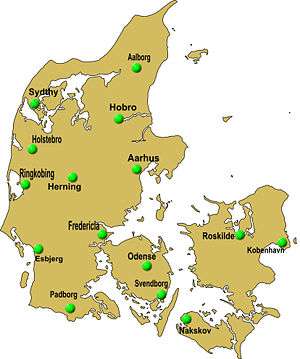Hydrogen link network

Places of the hydrogen link
The Hydrogen link network in Denmark was established in 2005 by the Nordic Transportpolitical Network to form a hydrogen highway with hydrogen Sweden and hynor as part of the Scandinavian hydrogen highway partnership.[1]
The planned highway is part of the hydrogen infrastructure. Two hydrogen re-fueling stations are open for public use in Denmark, and four more are planned, .[2][3]
Two hydrogen vehicles, the Hyundai ix35 FCEV and Toyota Mirai, have been announced for public distribution in 2015, but only a few dozen are expected to be sold or leased in Europe in 2015.
Public stations
| City | Location | |
| Aalborg | Scheduled to open in 2015[2] | |
| Copenhagen-1 | Open[3] - electrolysis of water | 55°38′48″N 12°32′28″E / 55.646773°N 12.540976°E |
| Copenhagen-2 | Scheduled to open in 2015[2] | 55°42′58″N 12°32′18″E / 55.716016°N 12.538281°E |
| Copenhagen-3 | Scheduled to open in 2015[2] | 55°44′45″N 12°30′33″E / 55.745771°N 12.509147°E |
| Holstebro | Open | 56°21′31″N 8°36′04″E / 56.358588°N 8.601123°E |
| Vejle | Scheduled to open in 2015[2] | 55°43′36″N 9°34′33″E / 55.726538°N 9.5759206°E |
Closed stations
- Århus - methanol reforming (steam reforming) and industrial H2.
- Fredericia - Biofuel reforming of methanol (steam reforming).
- Hobro - Natural gas reforming (steam reforming) and industrial H2
- Padborg - natural gas reforming (steam reforming). Electrolysis on-site.
- Ringkobing - Wind electrolysis.
- Sydthy - Wind electrolysis
See also
References
External links
This article is issued from Wikipedia - version of the 12/30/2014. The text is available under the Creative Commons Attribution/Share Alike but additional terms may apply for the media files.